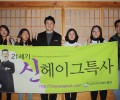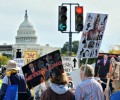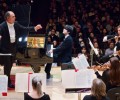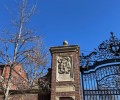| Remarkable Increase of Chinese International Students in Boston |
| 보스톤코리아 2012-12-17, 14:19:41 |
|
Written by HyunCheon Kim / Translated by SeungYun Woo
According to Kim, running a business in Allston, “Quite a lot of Chinese international students have been coming to Boston. I can’t really give statistical evidence but I see the number has been increased remarkably,” and it can be based on the fact that the increased number of Chinese students are easily found in Korean restaurants. A broker of a real estate agency in Allston also said, “I’ve been receiving many Chinese international students as customers.” Moreover, Korean hair salons as well are taking fairly a large number of Chinese customers. Na-kyung Baek, the hairdresser of Beautiful Cuts, said, “Many of them are international students from Northeastern University and Boston University and also Chinese housewives visit often.” About the rapid increase of Chinese international students (those with Bachelor’s degrees or above), the owner of BonChon (Allston), Hyuk Kim, said, “if we look at it from a short-term perspective, it could be great news for business owners; however, in the long-term, we can’t be really happy about it.” Kim reasoned that, “If the number of Chinese increases as it has recently, then it’s possible that the Korean community will be eventually eaten into by the Chinese community.” According to the data reported from the Institute of International Education on November 12, the number of Chinese international students has increased 30% within the past two years. In 2010, the population of Chinese international students was 6,003, which recorded the highest growth rate, 29.9%, and it has increased up to 9,819 by 2012. In total, they comprise 23.8% of 41,258, the total number of international students in Massachusetts. Compared to the growth rate of Korean international students in Massachusetts, which is 3.6% from 2010 (2,754) to 2012 (2,764), that of Chinese international students is in remarkable contrast. Even the population of Korean international students has decreased by 3.5% from last year. Furthermore, China has been in the first place after beating India as having the highest rate of international students starting from 2009. The reason for the remarkable increase of Chinese students is “the rise of China’s economy,” according to economists. Jong-sung Kim, an economics professor at Bryant University, said, “The average tuition in America is far more expensive than that in China and it’s hard to receive financial aid from universities as international students. Then we can assume that the rapid increase of Chinese international students, despite the above facts, results from the improvement of income as China’s economy has risen.” Also, another economics professor at Lasell College & NSCC, Moon-su Han, said, “After 2010, China has shown very rapid improvement in the rate of economic growth. As a result, the top 30% have become financially well off, but inequality of income distribution has deepened.” Additionally, Han said, “Although China is successful achieving their economic growth, the employment rate of graduates has decreased since 2010. I think that studying in America is another great chance for graduate students who failed to secure employment in China. Also, the difference of the exchange rate between U.S. dollars and the China RMB (renminbi) has decreased and it has become much easier and cheaper for Chinese to study abroad at their own expense.” Moreover, by pointing out the fact that the Chinese workforce is concentrated in labor-intensive product manufacturing, Han added, “If China is to improve economic growth continuously, they need to focus on manufacturing high-value products, such as cars, trains, ships, airplanes and communication equipment.” Han analyzed that this is the reason they need to study abroad in an advanced country. In fact, Han’s analysis appears to be true in reality. Sun Won, a current student at Northeastern University said, “I came to the U.S because it’s one of the most advanced countries and I wanted to have an education here. I’m planning to go back to China after I graduate and I’ll work for China’s industrial development.” Lastly, professor Jong-sung Kim, siting the situation of the United States where the number of college students in the freshman-year age group is decreasing due to the change of population, said, “Those colleges in America with a lack of competitiveness will actively invite foreign students for their own operation. Then, more Chinese will move to America in the future.” ⓒ 보스톤코리아(http://www.bostonkorea.com), 무단전재 및 재배포 금지 |
 |
 의견목록 [의견수 : 0]
의견목록 [의견수 : 0]
|
 |
| 등록된 의견이 없습니다. | |
|
|
 프리미엄 광고
프리미엄 광고

161 Harvard Avenue, Suite 4D, Allston, MA 02134
Tel. 617-254-4654 | Fax. 617-254-4210 | Email. [email protected]
Copyright(C) 2006-2018 by BostonKorea.com All Rights Reserved.
Designed and Managed by Loopivot.com























